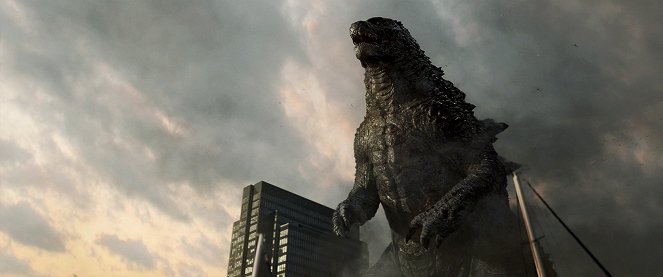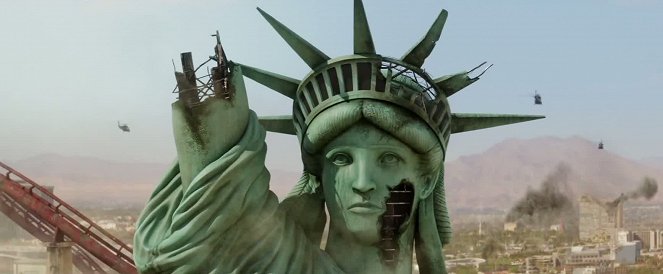Directed by:
Gareth EdwardsCinematography:
Seamus McGarveyComposer:
Alexandre DesplatCast:
Aaron Taylor-Johnson, Bryan Cranston, Elizabeth Olsen, Juliette Binoche, David Strathairn, Ken Watanabe, Al Sapienza, Sally Hawkins, Brian Markinson (more)VOD (5)
Plots(1)
The iconic movie monster gets a brilliant 21st century makeover in this breathtaking blockbuster! A devastating catastrophe engulfs Japan's Janjira nuclear power plant in 1999. Fifteen years later, US physicist Joe Brody (Bryan Cranston) remains convinced that a natural disaster was not responsible. He believes there's been a high-level cover-up. His quest for the truth reunites him with his Navy Lieutenant son, Ford (Aaron Taylor-Johnson). Among those drawn into joining their mission are Ford's wife Elle (Elizabeth Olsen) and military commander Admiral Stenz (David Strathairn). Japanese scientist Daisuke Serizawa (Ken Watanabe) quickly recognises that man's abuse of nature is responsible for the mighty, radiation-enhanced Godzilla - and the terrifying foes against which it is now pitted! (official distributor synopsis)
(more)Videos (23)
Reviews (20)
Godzilla is a movie that sticks to safe clichés, is appropriate for all audiences and is not surprising surprise, but at least it holds together (Pacific Rim was bolder and cooler, but its plot didn’t work). Unlike Roland Emmerich’s version, it also honors the rules of the Japanese cult classic and, with Hollywood’s technical capabilities, allows the Japanese to enjoy their beloved monster as they have never seen it before. Though played by award-winning actors rarely seen in blockbusters, the characters are secondary, as the most important thing here is overall epicness and atmospheric visuals in the spirit of Steven Spielberg’s adventure movies. Spielberg is also referenced in specific scenes, such as the initial helicopter flight to the island and repeated placement of children in every exciting action scene. Watching it today, I feel satisfied; five years ago, I might even have been enthusiastic.
()
Watching a blockbuster that is heavily schematic (the family archetype of soldier-sibling, the chessboard of supporting characters) while in many ways scrupulously circumventing genre stereotypes (the edited monster fights!), all the while building up space with precise camerawork and unnerving music, is simply a pure joy that is amplified several times over in the final battle to the required epic scope. Or it's been a long time since a destruction genre film made me so happy by actually being a conversational drama. PS: It will probably not be possible to beat the visual highlight of skydiving this year.
()
Indie directors shouldn’t get into commercial blockbusters, so I wouldn’t look forward to it only to be disappointed. There’s enough action, I believe, but it’s not exciting, which is a far bigger problem than if there was not enough action. The most interesting characters are removed in the first act, and for the remainder of the film, everyone stands staring like a moron, or either think up some bullshit (the bomb here is used in the same weird way as in the last Batman from Nolan) or try to arouse the emotions of the viewer (unsuccessfully). If they had “forgotten” about the story and just let the monsters beat the crap out of each other, it would’ve been better. But they didn’t and the result is painful several times. Visually it’s great, as expected, I would love to print out some frames and hang them on the wall, but when things move it’s really bland. And what pissed me off the most was that the unidimensional protagonist always shows up by chance exactly where the monster is heading. Were the Japanese Godzilla from the past the same? If that is the case, the bullshit has remained bullshit. And I don’t like bullshit.
()
The screenplay builds on the clash of civilization with nature and is clearly based on the assumption that humanity is a relic of the past. How else can you explain that the characters are stenciled, sometimes speak like they have ingested psychotropic substances, and have no meaningful dramatic arcs? Only the most shabby vicissitudes of all remain - dad has to find his family. The rest is quickly zipped into bags and dismissed by a few approximate sentences. There is no realism, deeper psychology and provocative work with familiar motives (perhaps only death / generally serious stylization are unusually frequent guests here). The second covert (apparently) misanthropic element is the actions of human command, which he plans with the ingenuity of the Stone Age, and if anyone sees a deeper meaning in his actions, please let me know, preferably in writing and with drawings. So what we have left is Godzilla vs. MUTO + an ant human perspective, which can fragment the monster clash, cover it in time or inadvertently see it in all its gigantic majesty. People are simply not here to act and be interesting in and of themselves, but to be able to watch, and the film can be saturated with their views. Here, Gareth Edwards and his crew demonstrate that sometimes it is simply enough to supply nutritious food for the eyes and ears, and the effect still appears in the middle of a dysfunctional human story. Intoxicated by the scale of the monster, its clever aestheticization and framing in photogenic compositions is the meaning of Godzilla as a whole, which is slower and more majestic than usual. Similar to a couple of well-timed scenes and the old school thunder of Alexandre Desplat in the orchestra pit. The monsters from the depths have exactly the ballbusting vibration I expected from Pacific Rim. I finally get it in edible form a year later. We can speculate whether next year someone will deliver what was expected of Godzilla for a change. [75%]
()
I understand the concept and I see the ambition of the filmmakers, but I can’t help it, the emperor has no clothes. The new American Godzilla is emblematic of our times – a typically exceedingly sophisticated film that’s informed by its roots, which it tries to update and recapture. This time, however, it works only on paper. Yes, we have here an attempt to make an American movie that is more faithful to the Japanese style of kaiju films, but it also embraces the influence of the (from a later perspective, atypical) serious first Godzilla. At the same time, the ambition here is to make a spectacular monster movie, but one in which people will be reduced to tiny creatures who are helpless against nature while also being conceived of as a simple anti-blockbuster in which everything will be conditioned by an ant’s perspective and the viewers will see what the characters themselves see instead of genre money shots. And the reason it doesn’t work is, paradoxically, what they tried to build the film on in the first place: the screenplay and the characters. The secret of the success of the in many ways similar Cloverfield and The Host lies in the consistent adherence to and use of the concept. Cloverfield sticks with the found-footage technique and its characters remain one-dimensional in the interest of giving priority to the monster as a catastrophe that towers over the tiny humans. Conversely, by developing its characters and highlighting the contrast between the commonplace and the monster, as well as the films unpredictable anti-genre nature, The Host manages to express the true nature of the monstrosity towering over the humans with its incomprehensibility. Edwards seems to want to have it both ways, but he doesn’t stick with either. The characters’ perspective and the denial of an ideal point of view become mere quirks when he regularly comes up with compensation in the form of a money shot from a splendid angle. The characters represent a completely absurd manifestation of the attempt to fake a sense of depth. What sense does it make to fill almost all of the major roles with established character actors (with the exception of the protagonist played by a walking pudding) and then give them ridiculously formulaic characters that even the best actor or actress can’t squeeze anything out of? I don’t understand how some reviewers can praise the passivisation of the characters when the film plays by the usual rules. Though it’s true that the most destructive weapons have no effect on the monsters this time, a more essential role is played by the gumption of the central all-American good guy, who not only eliminates all of the embryos of the other monsters, but at the same time also saves Godzilla’s neck in a showdown with the gigantic vermin. Not to mention the way he impeccably reunites strangers and even his own family and survives everything from the long journey home to nuclear explosions unscathed. The result is another contribution to the category of lavishly informed and well-thought-out remakes and adaptations in which experts can show off their ability to discern influences and transformations in comparison with the originals that inspired them. When we take a more detached view, however, all that remains is a burst bubble that may be mesmerising in the cinema with its subtly spectacular nature, but it comes up short at home (even on a big-screen TV). On the other hand, it’s necessary to acknowledge that if one survives the first hour of dysfunctional exposition and then submits to the ridiculous utilitarianism and contrivance of the smallest details, the fiercely serious American Godzilla provides as much of a campy spectacle as the classic, playful adventures of its Japanese inspiration.
()
(less)
(more)
Gallery (161)
Photo © Warner Bros.



Ads